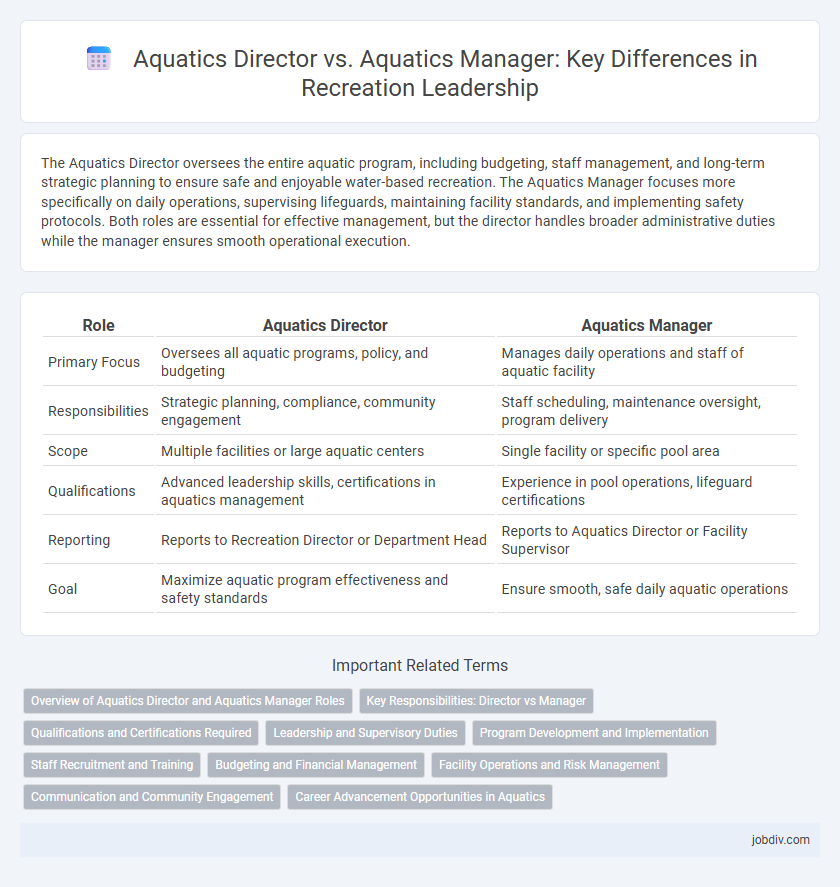The Aquatics Director oversees the entire aquatic program, including budgeting, staff management, and long-term strategic planning to ensure safe and enjoyable water-based recreation. The Aquatics Manager focuses more specifically on daily operations, supervising lifeguards, maintaining facility standards, and implementing safety protocols. Both roles are essential for effective management, but the director handles broader administrative duties while the manager ensures smooth operational execution.
Table of Comparison
| Role | Aquatics Director | Aquatics Manager |
|---|---|---|
| Primary Focus | Oversees all aquatic programs, policy, and budgeting | Manages daily operations and staff of aquatic facility |
| Responsibilities | Strategic planning, compliance, community engagement | Staff scheduling, maintenance oversight, program delivery |
| Scope | Multiple facilities or large aquatic centers | Single facility or specific pool area |
| Qualifications | Advanced leadership skills, certifications in aquatics management | Experience in pool operations, lifeguard certifications |
| Reporting | Reports to Recreation Director or Department Head | Reports to Aquatics Director or Facility Supervisor |
| Goal | Maximize aquatic program effectiveness and safety standards | Ensure smooth, safe daily aquatic operations |
Overview of Aquatics Director and Aquatics Manager Roles
The Aquatics Director oversees the strategic planning and overall operations of aquatics programs, ensuring safety compliance, staff management, and budgeting for swimming facilities. The Aquatics Manager focuses on daily operational management, including supervising lifeguards, coordinating swim lessons, and maintaining facility standards. Both roles are essential for delivering safe, organized, and effective aquatic recreation experiences.
Key Responsibilities: Director vs Manager
An Aquatics Director oversees strategic planning, budgeting, and compliance for all aquatic programs, ensuring safety and quality standards across facilities. An Aquatics Manager focuses on operational management, including staff supervision, daily scheduling, and direct program implementation. Directors prioritize long-term goals and policy development, while Managers handle tactical execution and on-site problem-solving.
Qualifications and Certifications Required
An Aquatics Director typically requires advanced certifications such as Certified Pool Operator (CPO), Lifeguard Instructor Trainer credentials, and often a degree in recreation management or a related field, reflecting extensive leadership experience. Aquatics Managers usually hold foundational certifications like lifeguard instructor, first aid/CPR, and basic pool operation credentials, emphasizing operational oversight and staff supervision. Both roles prioritize strong knowledge of water safety protocols, but the director position demands higher qualifications to ensure comprehensive facility management and regulatory compliance.
Leadership and Supervisory Duties
An Aquatics Director oversees the entire aquatic program, focusing on strategic leadership, budget management, and policy development to ensure facility safety and customer satisfaction. An Aquatics Manager primarily handles day-to-day supervisory duties, including staff scheduling, training, and operational oversight of swim lessons, lifeguards, and maintenance. Leadership for the Director involves long-term planning and community engagement, while the Manager emphasizes direct team coordination and on-site problem resolution.
Program Development and Implementation
An Aquatics Director oversees comprehensive program development and strategic implementation for aquatic facilities, ensuring alignment with organizational goals and community needs. An Aquatics Manager focuses on the day-to-day execution of these programs, managing staff schedules, and maintaining safety protocols during activities. Both roles require expertise in aquatic program planning, but the Director emphasizes long-term vision while the Manager handles operational details.
Staff Recruitment and Training
The Aquatics Director oversees strategic staff recruitment and develops comprehensive training programs to ensure lifeguards and instructors meet safety and certification standards. The Aquatics Manager handles day-to-day staff scheduling and implements training sessions focused on operational efficiency and emergency response. Both roles are essential for maintaining a skilled aquatics team, but the Director focuses on broader recruitment policies while the Manager emphasizes practical staff development.
Budgeting and Financial Management
Aquatics Directors typically oversee the entire budgeting process for aquatic facilities, including long-term financial planning and resource allocation to ensure sustainability and growth. Aquatics Managers focus more on day-to-day financial management, monitoring operational expenses, scheduling staff within budget constraints, and managing equipment purchases. Both roles require strong financial acumen, but the Director's responsibilities encompass broader fiscal strategy, while the Manager handles tactical budget adherence.
Facility Operations and Risk Management
An Aquatics Director oversees facility operations by establishing safety protocols, budgeting for maintenance, and ensuring compliance with regulatory standards to minimize risks. In contrast, an Aquatics Manager focuses on day-to-day facility operations, including staff supervision, scheduling lifeguards, and conducting regular safety inspections to maintain a secure swimming environment. Both roles collaborate on risk management, but the Director strategically develops policies, while the Manager implements and monitors these practices on-site.
Communication and Community Engagement
Aquatics Directors typically develop strategic communication plans to enhance community engagement by collaborating with local organizations and stakeholders, ensuring broad outreach and program visibility. Aquatics Managers focus on day-to-day communication with staff and participants, directly addressing concerns and promoting program activities to foster a welcoming aquatic environment. Both roles prioritize effective communication to build trust, encourage participation, and strengthen community relationships within aquatic recreational programs.
Career Advancement Opportunities in Aquatics
Aquatics Directors typically have broader leadership responsibilities and oversee multiple facilities or programs, making this role a key step for career advancement in the recreation industry. Aquatics Managers focus on day-to-day operations and staff supervision within a single facility, providing essential management experience that can lead to director-level positions. Transitioning from Aquatics Manager to Director often involves gaining advanced certifications, specialized training, and demonstrated success in program development and strategic planning.
Aquatics Director vs Aquatics Manager Infographic

 jobdiv.com
jobdiv.com